Week 66: 2-8 December 1940
Back in September Italian forces had invaded Egypt, which was being occupied by British troops: the attack had ground to a halt after a few days and the Italian forces had assumed defensive positions. Now the British prepared to counter-attack, and on the nights of 7-8 December advanced into position close to the Italian defences. Also this week, in Albania, Greek forces continued to drive the Italian army back; and General Franco ruled out Spanish entry into the war.
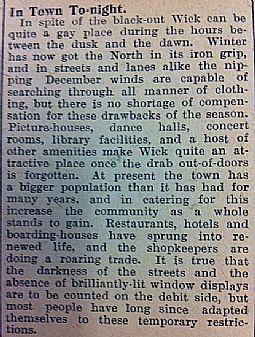 Far from the heat of the North African desert, the John O’Groat Journal noted that the arrival of December meant that “Winter has now got the North in its iron grip”. However, “In spite of the black-out Wick can be quite a gay place during the hours between the dusk and dawn … Picture-houses, dance halls, concert rooms, library facilities, and a host of other amenities make Wick quite an attractive place once the drab out-of-doors is forgotten.”
Far from the heat of the North African desert, the John O’Groat Journal noted that the arrival of December meant that “Winter has now got the North in its iron grip”. However, “In spite of the black-out Wick can be quite a gay place during the hours between the dusk and dawn … Picture-houses, dance halls, concert rooms, library facilities, and a host of other amenities make Wick quite an attractive place once the drab out-of-doors is forgotten.”
With winter already here, and Christmas coming, all over the county people were busy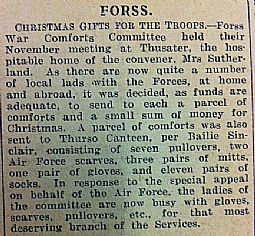
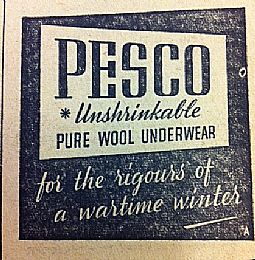 fundraising, knitting and gathering “comforts” for the troops. These were usually balaclavas, scarves, gloves, socks, jumpers and blankets, and were often sent with packs of sweets and cigarettes, or money. The Forss War Comforts Committee was typical: “As there are now quite a number of local lads with the Forces, at home and abroad, it was decided as funds are adequate, to send to each a parcel of comforts and a small sum of money for Christmas.”
fundraising, knitting and gathering “comforts” for the troops. These were usually balaclavas, scarves, gloves, socks, jumpers and blankets, and were often sent with packs of sweets and cigarettes, or money. The Forss War Comforts Committee was typical: “As there are now quite a number of local lads with the Forces, at home and abroad, it was decided as funds are adequate, to send to each a parcel of comforts and a small sum of money for Christmas.”
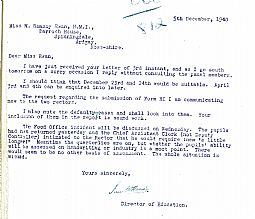 Meanwhile, the Director of Education was outraged to discover that some children had been taken to work in the local Food Office when they should have been taking exams. On 5 December he wrote, “The pupils had not returned yesterday and the Chief Assistant Clerk … intimated to the Rector that he would require them ‘a little longer!’ Meantime the quarterlies are on, but whether the pupils will be assessed on handwriting or industry is a moot point … The whole situation is wicked.”
Meanwhile, the Director of Education was outraged to discover that some children had been taken to work in the local Food Office when they should have been taking exams. On 5 December he wrote, “The pupils had not returned yesterday and the Chief Assistant Clerk … intimated to the Rector that he would require them ‘a little longer!’ Meantime the quarterlies are on, but whether the pupils will be assessed on handwriting or industry is a moot point … The whole situation is wicked.”
Finally this week, the John O’Groat Journal noted the restriction in the rules for burning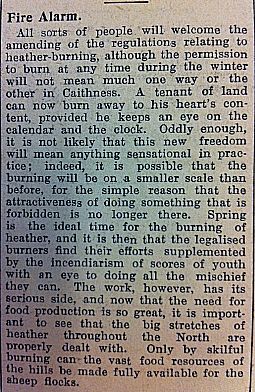 heather, which could now be done in the winter during the hours of daylight, and had previously been against the law. The reporter pointed out that it “will not mean much one way or the other in Caithness”; but added “indeed, it is possible that the burning will be on a smaller scale than before, for the simple reason that the attractiveness of doing something that is forbidden is no longer there.”
heather, which could now be done in the winter during the hours of daylight, and had previously been against the law. The reporter pointed out that it “will not mean much one way or the other in Caithness”; but added “indeed, it is possible that the burning will be on a smaller scale than before, for the simple reason that the attractiveness of doing something that is forbidden is no longer there.”
Coming soon! Week 67, 9th - 15th December 1940, will be published on Monday 9th December 2013. To view previous issues please use the menus on the right hand side of the page.
Come and join us on Facebook, let us know what you think about Caithness At War, ask any questions you may have or just say hello! Click on the Facebook link below to be taken directly to our page.
www.facebook.com/caithnessarchives
Comments
"In town tonight" that paragraph
heading must have been borrowed from a popular Monday night BBC radio programme which was broadcast from London - it contained a mix of news about celebs and such like with items about films and theatre etc with a few songs and musical items.
YES wick was quite a gay place in those days (when gay meant gay)and I remember once going into town with my father by bus on a Thursday which was mart day and all the farmers and wives would come into town to buy and sell animals and go to the bank etc. The streets were thronged with off duty soldiers and airmen and if there was a warship in the bay a liberty boat would disgorge squads of sailors all in uniform. What they did with their time I could not tell but presumably they went to the Naffi.
There was one restaurant that opened up called "The Dolhin " on Bridge Street upstairs near R S Waters and there I tasted my first French Fried Potato or chip and it was unforgettable. I remember the place was full of airmen and two sat at our the table. We had tomatoes and chips and tea. With my Dad and I they explained their badges of rank etc to us as they were in uniform. One was a flight sergeant. I remember especially the Military policemen who used to patrol in pairs smart in their immaculate uniforms and black boots. The RAF police were there too and were always corporals, tall men and tough looking and quite frightening and you never made eye contact.
As for burning heather we kids on the way home from school would set fire to bushes of old grass or rushes on the side of the road and to an occasional whin or gorse bush if we came on one. This was not exactly condoned but tolerated provided the blaze did not destroy fencing posts. I once remember the whole hill at Seater ablaze (Where the dump is now) and a few folks who had grazings and peat cutting rights tried to put out.
The Director of Education was indeed a big cheese in those days and a visit from him to the school was indeed a red letter day and feared by teacher and pupils alike never knowing what would take place.
We had a dig for victory programe and each class was given a small vegetable patch in the large garden in the playground. We were given seed packets and we had all the implements plus a huge wheel barrow. Growing leaks, peas and cabbages we did but school holidays meant that our crops were not tended then and were ravished by birds caterpillars or over grown with weeds by the start of next term.
The only thing that we grew with any success was potatoes and some peas but as we were from farming families in the main it did not matter much although our dear teacher Miss Slater I suppose enjoyed them.
Those were the days.





